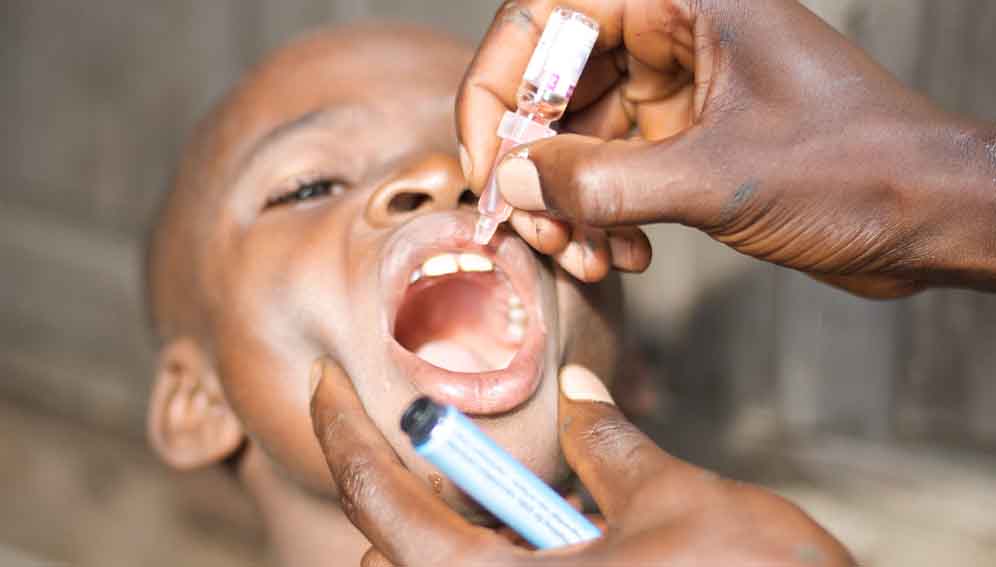BREAKING! UN AND WHO Finally Admits That The New Polio Outbreak In Sudan And Elsewhere In Africa Is Caused By A Oral Polio Vaccine Gone Wrong
Source: Polio Vaccine Sep 02, 2020 5 years, 1 month, 1 week, 6 days, 22 hours, 26 minutes ago
Vaccines are basically meant to protect individuals against a disease but in some cases the things could go wrong and backfire especially when proper studies are not conducted and things are expedited over monetary concerns.

The WHO or World Health Organization finally admitted that a new
polio outbreak in Sudan is linked to an ongoing vaccine-sparked epidemic in Chad, a week after the U.N. health agency declared the African continent free of the wild polio virus.
Only a week ago the WHO had press conferences declaring that the African continent was free of the wild polio virus, calling it "an incredible and emotional day."
However yesterday, the WHO warned that the risk of further spread of the vaccine-derived polio across central Africa and the Horn of Africa was "high," noting the large-scale population movements in the region.
Polio, or poliomyelitis, is a disabling and life-threatening disease caused by the poliovirus. The virus spreads from person to person and can infect a person's spinal cord, causing paralysis
Vaccine-derived polioviruses (VDPVs) are rare strains of poliovirus that have genetically mutated from the strain contained in the oral polio vaccine. The oral polio vaccine contains a live, attenuated (weakened) vaccine-virus. When a child is vaccinated, the weakened vaccine-virus replicates in the intestine and enters into the bloodstream, triggering a protective immune response in the child. Like wild poliovirus, the child excretes the vaccine-virus for a period of six to eight weeks. Importantly, as it is excreted, some of the vaccine-virus may no longer be the same as the original vaccine-virus as it has genetically altered during replication. This is called a VDPV.
However on very rare occasions, if a population is seriously under-immunized, there are enough susceptible children for the excreted vaccine-derived polioviruses to begin circulating in the community. If the vaccine-virus is able to circulate for a prolonged period of time uninterrupted, it can mutate and, over the course of 12-18 months, reacquire neurovirulence. These viruses are called circulating vaccine-derived polioviruses (cVDPV).
It has been found that the lower the population immunity, the longer these viruses survive. The longer they survive, the more they replicate, change, and exchange genetic material with other enteroviruses as they spread through a community.
However if a population is fully immunized against polio, it will be protected against the spread of both wild and vaccine strains of poliovirus.
Importantly episodes of circulating vaccine-derived poliovirus are rare. Over the past ten years ie a period during which more than 10 billion doses of oral polio vaccine were given worldwide, cVDPV outbreaks resulted in fewer than 800 cases cases.
However this current outbreak is of a concern. More than a dozen African countries are currently battling outbreaks of polio caused by the virus, including Angola, Congo, Nigeria and Zambia.
With the ongoing coronavirus pandemic caused by incompetency of the WHO that did not stop its global spread, many of the large-scale vaccina
tion campaigns needed to stamp out polio have been disrupted across Africa and elsewhere, leaving millions of children vulnerable to infection.
WHO and its partners In April, reluctantly recommended a temporary halt to mass polio immunization campaigns, recognizing the move could lead to a resurgence of the disease. In May, they reported that 46 campaigns to vaccinate children against polio had been suspended in 38 countries, mostly in Africa, because of the coronavirus pandemic.
Certain of the campaigns have recently been re-started, but health workers need to vaccinate more than 90% of children in their efforts to eradicate the paralytic disease.
Authorities and health officials had initially aimed to wipe out polio by 2000, a deadline repeatedly pushed back and missed. Wild polio remains endemic in Afghanistan and Pakistan; both countries also are struggling to contain outbreaks of vaccine-derived polio.
Although vaccination has played an instrumental role in the reduction of polio cases worldwide, the use of attenuated virus in the oral vaccine carries with it an inherent risk. The oral vaccine is a powerful tool in fighting polio in part because of its person-to-person transmission and resulting contact immunity.
But, under conditions of long-term circulation in undervaccinated populations, the virus can accumulate mutations that reverse the attenuation and result in vaccine virus strains that themselves cause polio.
Such resultant circulating vaccine-derived poliovirus (cVDPV) strains, polio outbreaks have periodically recurred in regions that have long been free of the wild virus, but where vaccination rates have fallen.
Oral vaccines can also give rise to persistent infection in immunodeficient individuals, with the virus eventually mutating into a more virulent immunodeficiency-associated vaccine-derived poliovirus (iVDPV). In particular, the type 2 strain seems prone to reversions, so in 2016 the eradication effort abandoned the trivalent oral vaccine containing attenuated strains of all three virus types and replaced it with a bivalent oral vaccine lacking the type 2 virus, while a separate monovalent type 2 vaccine (mOPV2) was to be used only to target existing cVDPV2 outbreaks.
In addition, a novel oral vaccine targeting type 2 (nOPV2) that has been genetically stabilized to make it less prone to give rise to circulating vaccine-derived strains is under development. Eradication efforts will eventually require all oral vaccination to be discontinued in favor of the use of injectable vaccines. These vaccines are more expensive and more difficult to deliver, and they lack the ability to induce contact immunity because they contain only killed virus, but they likewise are incapable of giving rise to vaccine-derived viral strains.
In some cases vaccines that are made in substandard ways and not properly tested can give rise to such incidences of cVDPV strains.
For more on
Polio Vaccines, keep on logging to Thailand Medical news.
